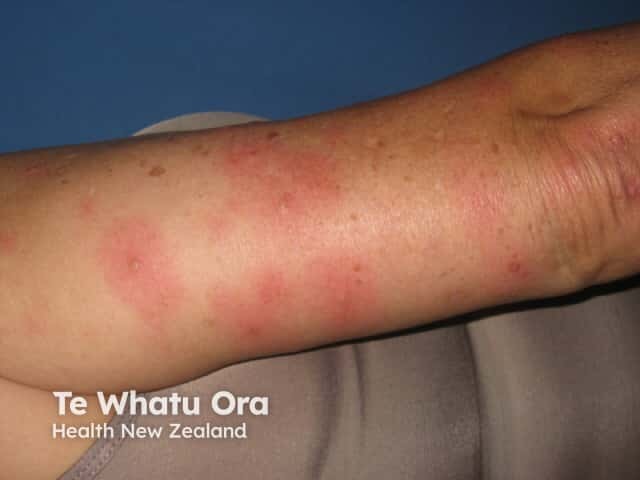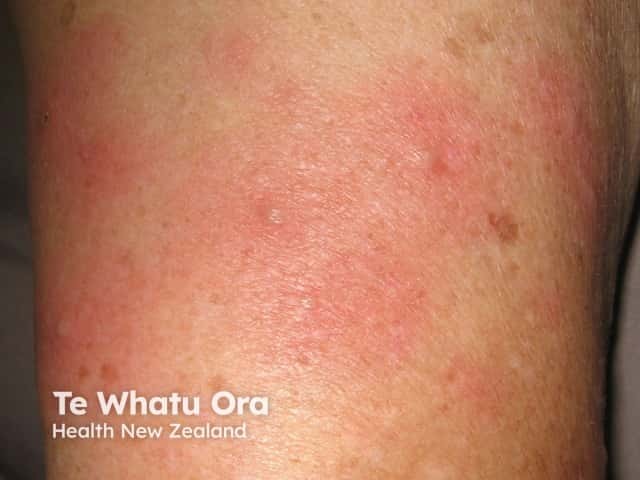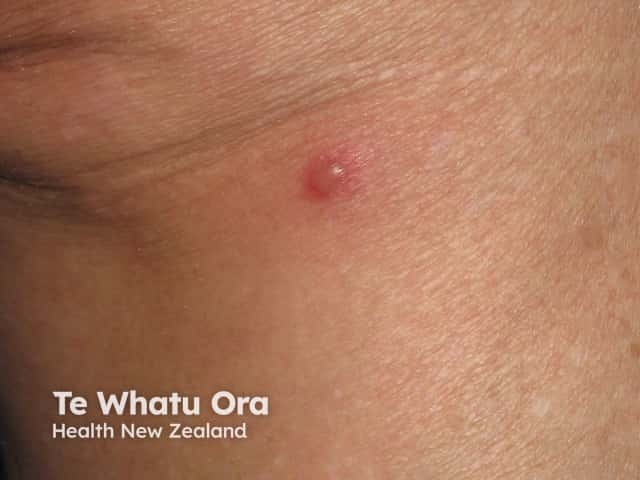Main menu
Common skin conditions

NEWS
Join DermNet PRO
Read more
Quick links
Bowel bypass syndrome — extra information
Bowel bypass syndrome
Author: Dr Harriet Cheng, Dermatology Registrar, Waikato Hospital, Hamilton, New Zealand, 2012.
What is bowel bypass syndrome?
Bowel bypass syndrome is also known as bowel-associated dermatitis-arthritis syndrome and blind loop syndrome.
Bowel bypass syndrome is a relapsing condition characterised by rash and arthritis. It is most commonly associated with bowel shortening surgery, where a ‘blind loop’ of bowel is created. This kind of surgery was previously popular for the treatment of morbid obesity. Up to 20% of patients undergoing bowel bypass surgery develop bowel bypass syndrome.
A similar syndrome has been reported in people who have not had bowel bypass surgery (‘bowel bypass syndrome without bowel bypass’). In these cases associated conditions have included:
- Diverticulitis
- Inflammatory bowel disease
- Peptic ulcer disease
What causes bowel bypass syndrome?
Bowel bypass syndrome is thought to be caused by bacterial overgrowth in a blind loop of bowel. A blind loop is a length of small intestine which digested food does not pass through. The effect is shortening of the small intestine, which leads to reduced absorption of fats and subsequent weight loss.
Bacterial overgrowth in the blind loop leads to release of bacterial antigens into the circulation. These antigens are called peptidoglycans. Peptidoglycans bind with circulating antibodies and these antibody-antigen complexes are deposited into skin and joints causing inflammation.
Bacteria identified as having a causative role in bowel bypass syndrome include:
- Escherichia coli
- Bacteroides fragilis
- Streptococcus species
What are the symptoms of bowel bypass syndrome?
Onset of symptoms of bowel bypass syndrome is usually 1-6 years following bowel bypass surgery. Symptoms usually last 2-4 weeks and may recur every 4-6 weeks.
Skin features
- Small red bumps (papules), blisters and pustules on trunk and upper arms
- May reassemble acute neutrophilic dermatosis (Sweet syndrome)
- Erythema nodosum
- Panniculitis
Non-cutaneous features
- Fever
- Muscle aches and pains
- Non-destructive polyarthritis (affecting many joints)
- Tenosynovitis (inflammation of tendons)

Skin rash due to bowel bypass syndrome

Skin rash due to bowel bypass syndrome

Skin rash due to bowel bypass syndrome
Other complications of bowel bypass surgery include:
- Persistent watery diarrhoea
- Electrolyte disturbance
- Liver failure
- Kidney stones
- Gallstones
- Vitamin A deficiency
- Zinc deficiency (an acrodermatitis enteropathica-like condition)
What investigations should be done?
In a patient with bowel bypass syndrome, investigations may reveal changes secondary to chronic malabsorption, including:
- Elevated creatinine due to dehydration
- Electrolyte disturbance
- Deranged liver function tests
Skin biopsy may reveal dilated dermal vessels and perivascular neutrophil granules in early lesions. More established lesions show infiltration of neutrophils, marked dermal oedema (swelling) and dermo-epidermal separation.
Treatment of bowel bypass syndrome
Surgical excision of the blind loop or revision of the bowel bypass cures bowel bypass syndrome.
Short courses of systemic corticosteroids are effective for symptoms but not curative.
Antibiotics may also be beneficial. Regimes reported to be effective include:
- Minocycline
- Erythromycin
- Clindamycin
- Trimethoprim + sulphamethoxazole
- Metronidazole
References
- Dermatology. Bolognia JL, Jorizzo JL, Rapini RP. Second edition. Mosby 2008. p389–91
- Ely P. The bowel bypass syndrome: a response to bacterial peptidoglycans. J AM Acad Dermatol. 1980; 2(6):473–87. PubMed
On DermNet
Other websites
- Blind loop syndrome — MedlinePlus
